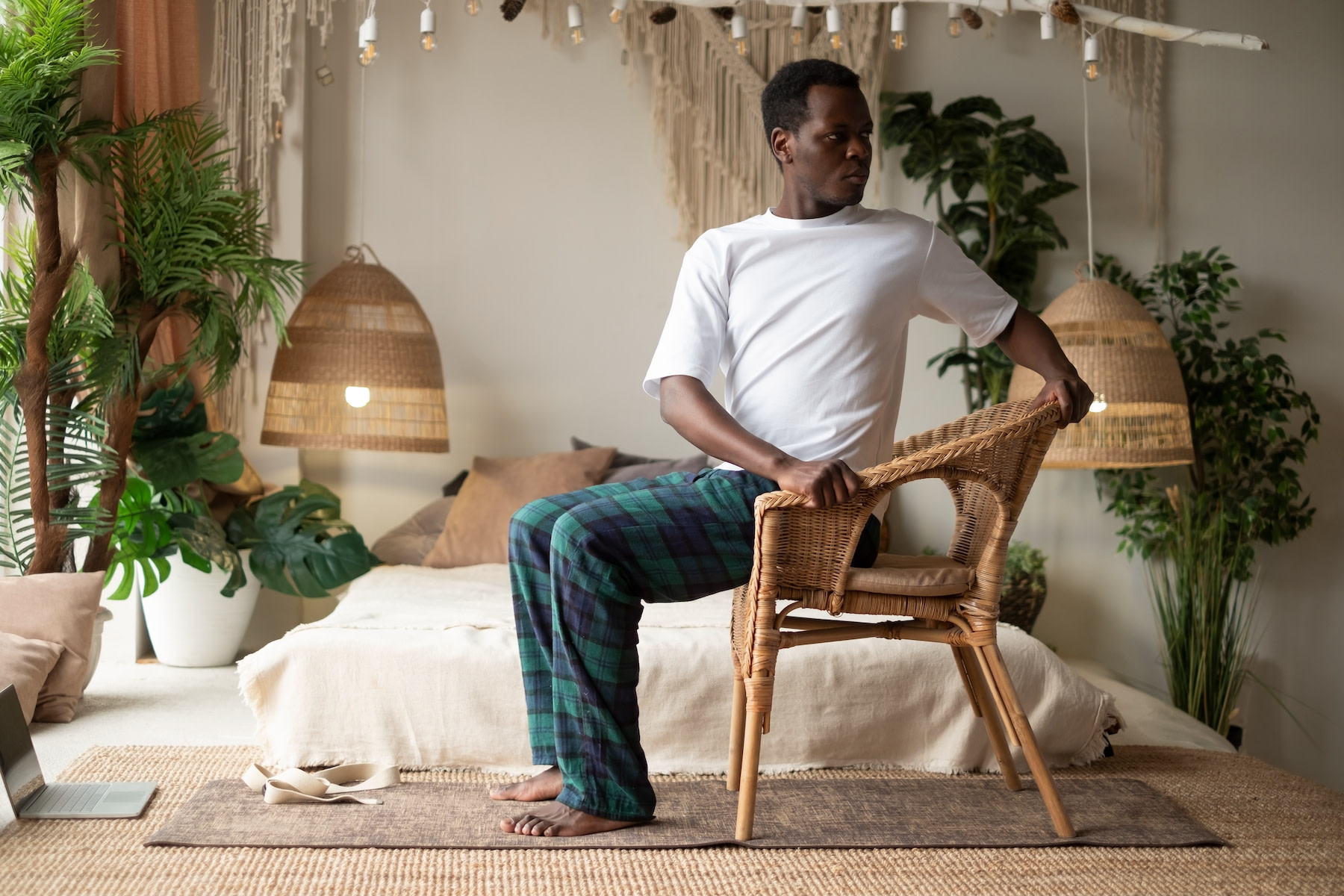
Koldunova_Anna/iStock / Getty Images Plus via Getty Images
6 Chair Yoga Poses You Can Practice Anywhere
Take a seat. It's time to stretch.
By Ingrid Yang•
What Is Chair Yoga?
Who Should Try Chair Yoga?
4 Key Benefits of Chair Yoga
6 Chair Yoga Poses to Try
3 Common Mistakes to Avoid in Chair Yoga
Chair yoga is for everyone—really. Regardless of whether you have limited mobility or simply spend all day sitting at your desk, this type of yoga is accessible, versatile, and, most importantly, beneficial. However, its virtues extend far beyond its adaptability. “Chair yoga empowers participants to find stability in their postures and explore yoga in multiple ways,” says Kristin McGee, a Peloton instructor.
What Is Chair Yoga?
Chair yoga is a modified form of yoga that allows you to practice poses while seated. It typically includes gentle stretches, breathing exercises, and meditation techniques. And unlike a more traditional yoga practice, which requires a mat and various standing or balancing poses, chair yoga is extremely adaptable. Whether you’re recovering from an injury, need a break while working at your desk, or are just lacking energy, chair yoga can provide a much-needed reset.
It’s also a great option if you’re new to yoga. “You can start small and build on,” Kristin says. This type of versatility allows you to comfortably progress at a pace that works best for your body’s needs. You can also lean on additional props beyond your chair, including blocks and straps, for added support and stability.
Who Should Try Chair Yoga?
It’s a common misconception that chair yoga is just for seniors or individuals recovering from injuries. That’s far from the truth. This practice is beneficial for busy parents, office workers, frequent drivers, and even students.
“We sit a lot,” Kristin says. “Chair yoga is the perfect way to combat all that comes with sitting for long periods of time.” Rather than having you strive for complex poses, chair yoga allows you to prioritize comfort and ease.
4 Key Benefits of Chair Yoga
Chair yoga provides a wide range of physical, mental, and emotional benefits. Some of these include:
1. Enhanced Flexibility and Mobility
Chair yoga helps improve your flexibility, allowing for a better range of motion and reduced joint stiffness. A 2023 study published in Healthcare found that the practice is particularly beneficial for individuals dealing with arthritis or chronic pain.
2. Stress Reduction and Relaxation
Engaging in chair yoga promotes relaxation and stress reduction through controlled breathing and gentle movements, leading to an increased sense of well-being.
3. Improved Strength and Balance
A regular chair yoga practice can improve your muscle strength and balance, according to a 2019 study published in Topics in Geriatric Rehabilitation. This means it can help decrease the risk of falls and injuries, particularly for those with limited mobility.
4. Community and Emotional Support
Chair yoga fosters a sense of community and belonging, providing emotional support and reducing feelings of isolation, especially when you practice with others. If you’re looking for a virtual community to join, try doing a class with friends on the Peloton App.
Incorporating chair yoga into your routine can lead to an improvement in your overall well-being, encouraging a healthier and more balanced lifestyle. You may even notice your new blissed-out state creeping over into other areas of your life. Chair yoga reminds us we can move anytime and anywhere, helping us feel better and combat unwanted stress, Kristin says.
6 Chair Yoga Poses to Try
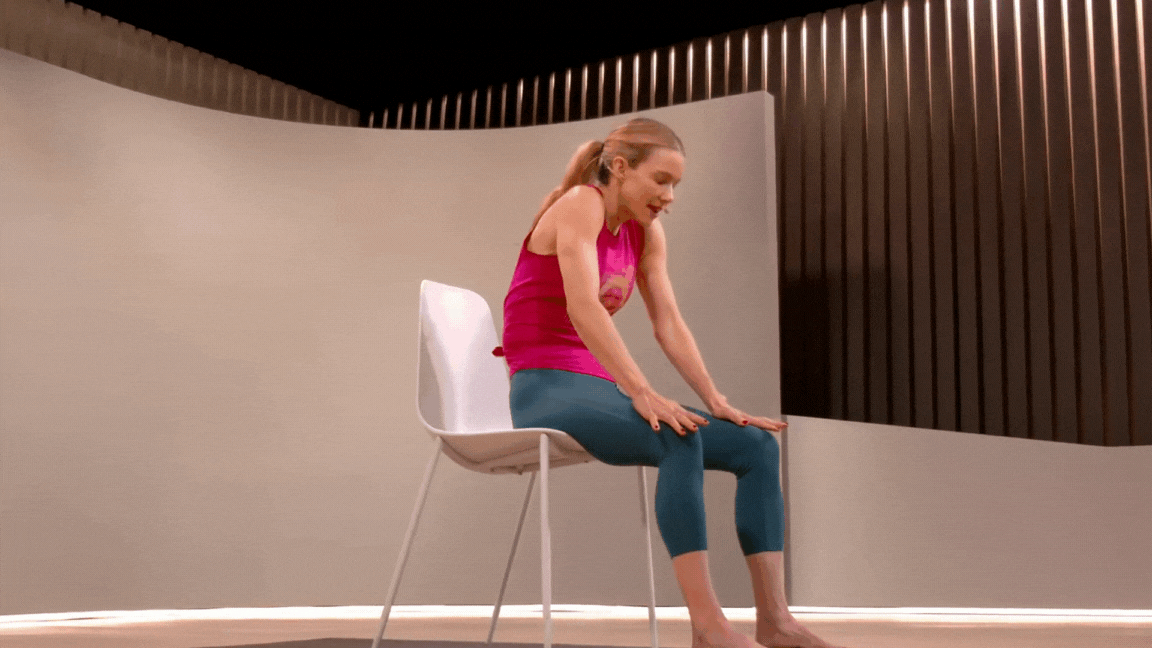
1. Seated Cat-Cow Stretch
This pose helps increase the flexibility of your spine, while also relieving tension in your back.
Sit on the edge of your chair with your feet flat on the floor.
Place your hands on your knees or thighs.
On an inhale, arch your back, and lift your chest. Hold this position for a second.
On your exhale, round your spine and drop your chin to your chest. Tuck your tailbone. Hold this position for a second.
Repeat for five to 10 breath cycles.
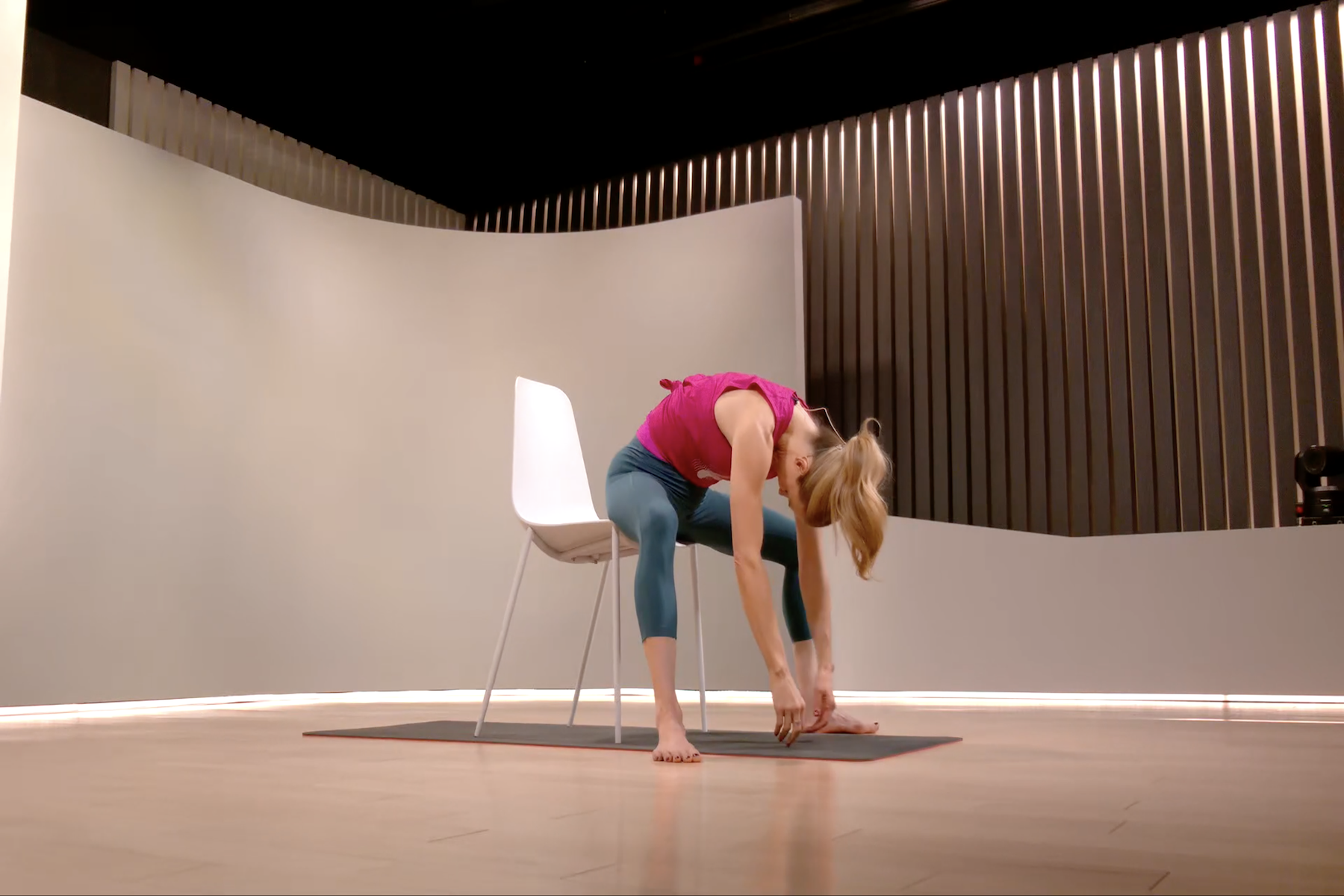
2. Seated Forward Bend
A classic posture, the seated version of forward bend stretches your hamstrings and helps relieve lower back tension.
Sit on the edge of your chair.
Stretch your legs straight in front of you with your feet dorsiflexed and spaced a bit further than hip-width apart.
On an inhale, lengthen your spine. On your exhale, hinge at your hips to fold forward.
Hold this position for five to eight breath cycles.
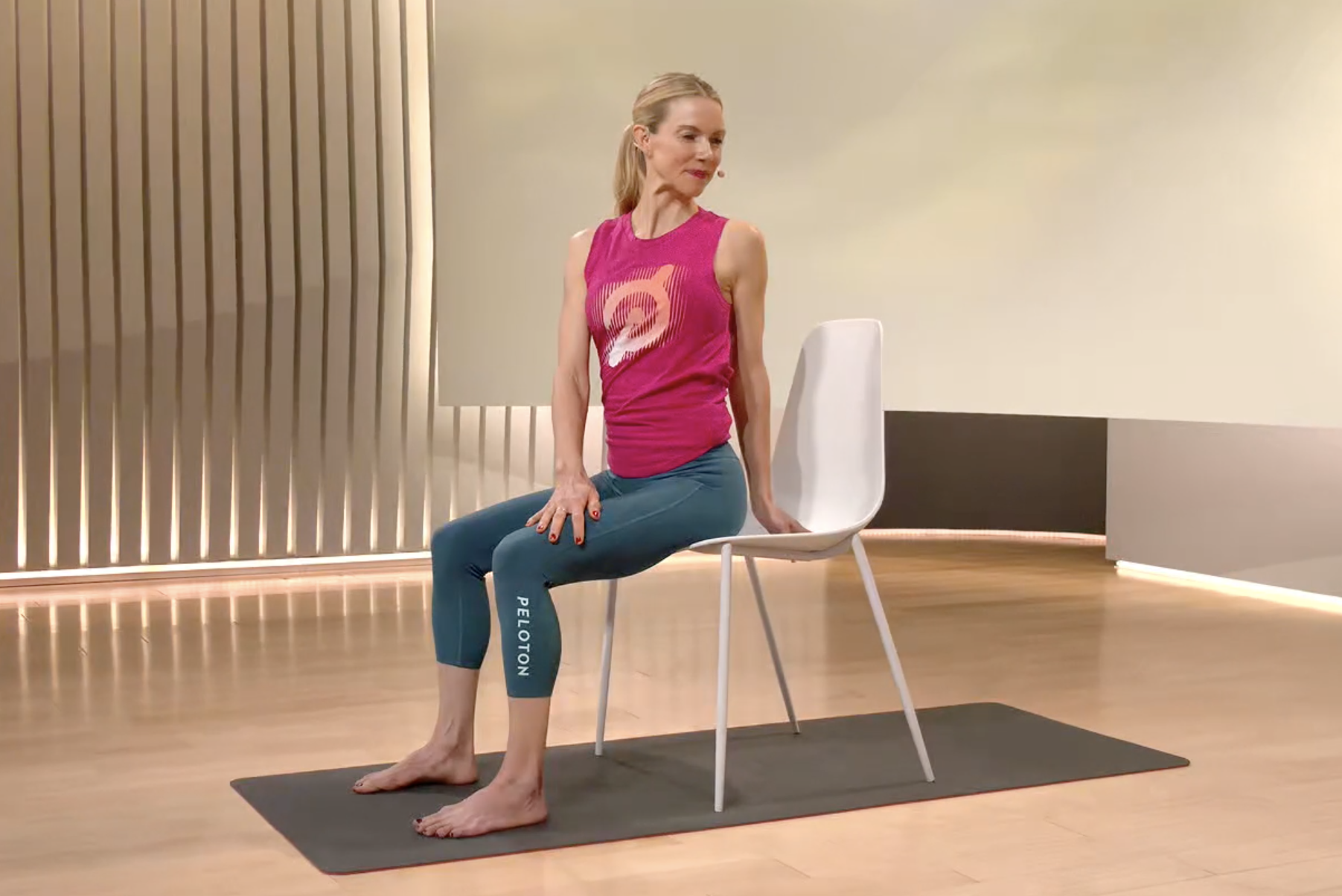
3. Seated Spinal Twist
This posture improves your spine mobility and loosens up your shoulders and neck.
Sit on the edge of your chair with your feet firmly planted on the floor.
Place your left hand on the seat of your chair, behind your body. Place your right hand on your left thigh.
On an inhale, lengthen your spine.
On your exhale, gently twist your torso to the left, using your hands for support.
Hold this position for three to five breaths. Maintain a relaxed and steady breath throughout. Switch sides and repeat.
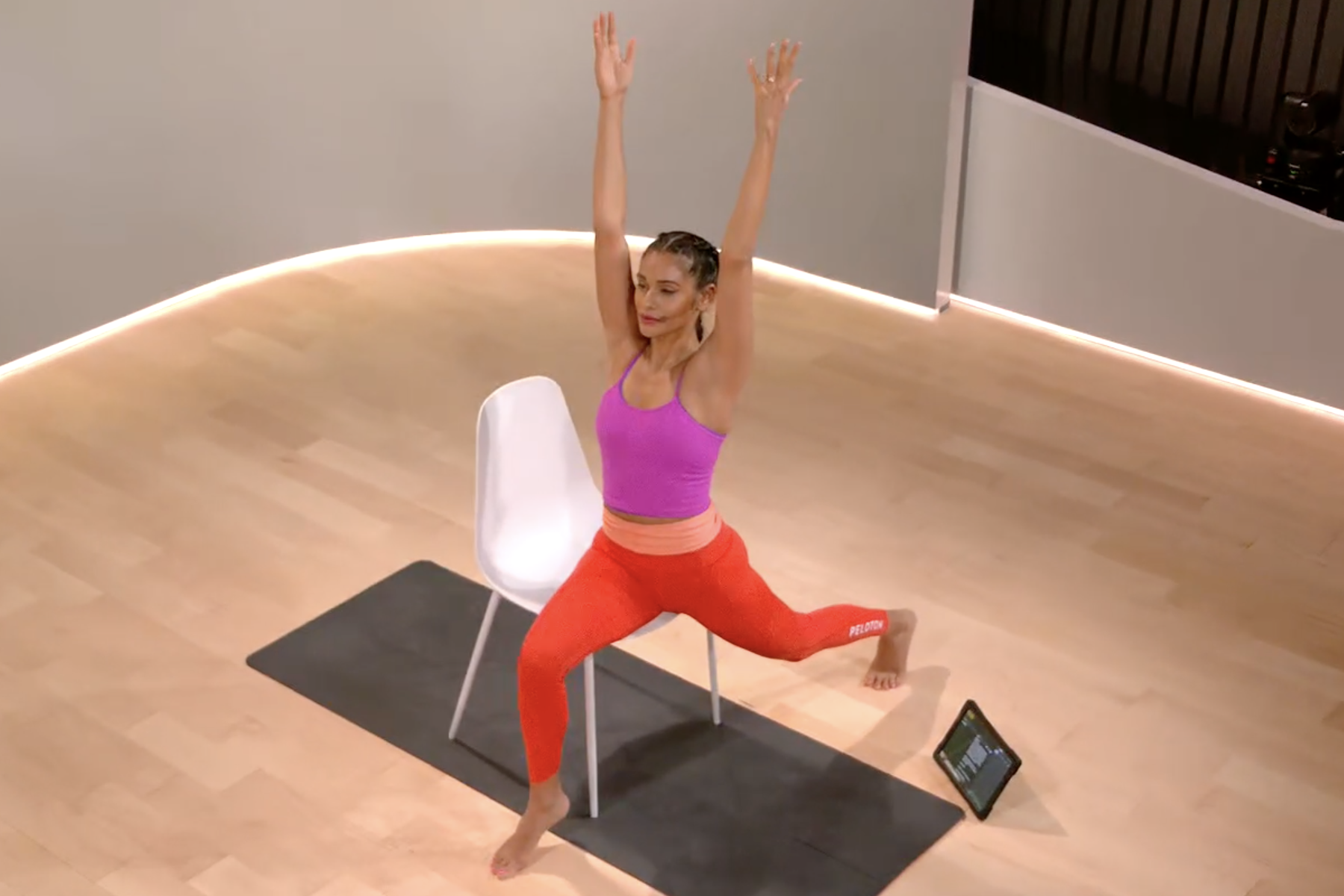
4. Seated Warrior I
This go-to posture strengthens your legs and improves your balance.
Rotate yourself to face the right side of your chair.
Bend your right knee at a 90-degree angle. Make sure the back of your right knee aligns with the right side of your chair.
Step your left foot back and straighten your left leg. It should be on the outside of the front edge of your chair.
On an inhale, raise both of your arms overhead, reaching toward the ceiling. Hold this pose for three to five slow breaths. Maintain a steady and relaxed breathing pattern.
Switch sides and repeat.
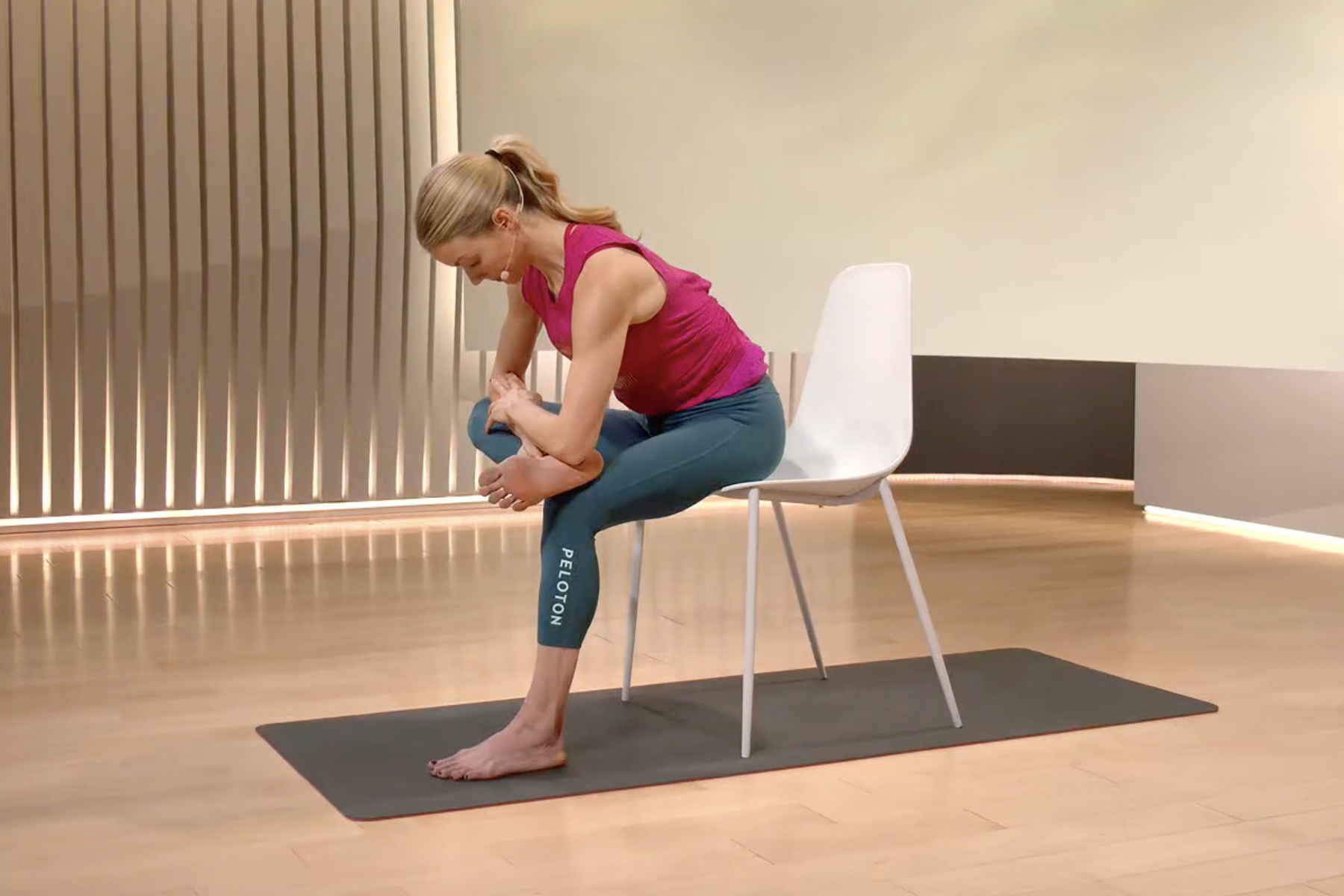
5. Seated Pigeon Pose
Feeling tightness in your hips? Seated pigeon pose helps relieve some of that tension—and improves your flexibility.
Sit on the edge of your chair. Cross your right ankle over your left knee.
Gently press on your right knee to deepen the stretch. Keep your back straight and your chest open.
Hold this position for five to eight slow and deep breaths. Allow yourself to sink deeper into the stretch with each exhale.
Switch sides and repeat.
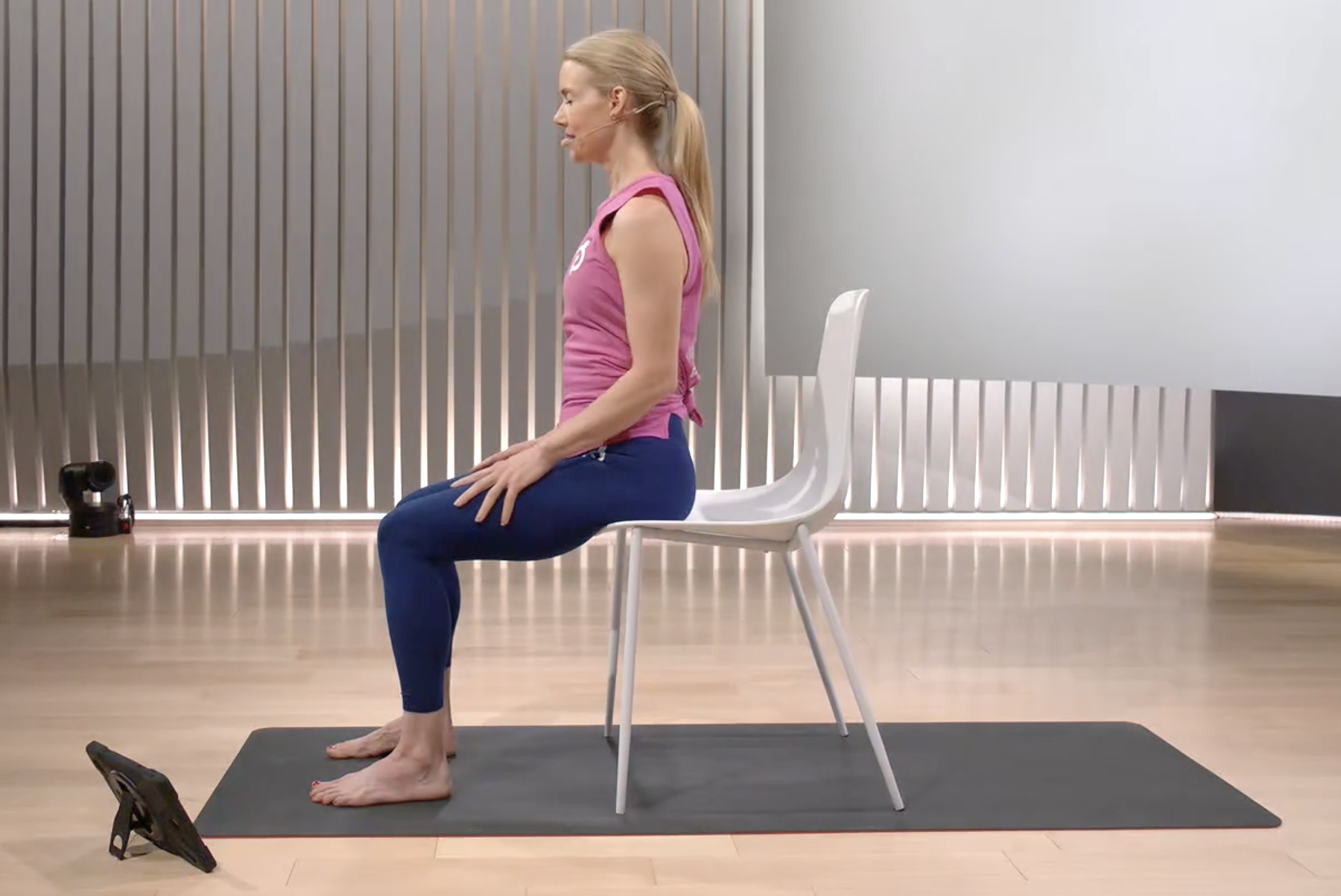
6. Seated Mountain Pose
This pose may seem simple, but it's so critical to your practice. Seated mountain pose promotes better posture and increased mindfulness.
Start by sitting tall in your chair. Firmly plant your feet on the ground. Rest your hands gently on your thighs.
Close your eyes and take a few deep, conscious breaths, allowing yourself to settle into the present moment.
With each breath, focus on elongating your spine. Visualize each vertebra stacking on top of the other. Feel the gentle lift from the base of your spine all the way to the crown of your head. Engage your core.
Maintain this posture and breathing pattern for 1 to 2 minutes.
3 Common Mistakes to Avoid in Chair Yoga
While chair yoga is generally considered safe and accessible, it's crucial to maintain proper alignment and avoid overexertion. Below, we break down some common mistakes to avoid.
1. Avoid Slouching
Kristin warns that if you’re not paying attention, you might start to slouch in your chair. To avoid this and maintain good posture, she recommends sitting toward the front of your chair and firmly planting your feet on the ground.
2. Remember to Breathe
Have you ever been so focused that you suddenly notice you’re holding your breath? (Don’t worry: It happens to all of us.) Be sure to incorporate deep breaths into your movement to avoid creating unwanted tension.
3. Listen to Your Body
Psst: Yoga is meant to feel good. While it can be fun to challenge yourself, avoid forcing movements beyond your comfort level. Listen to your body and work within your range of motion. If you start to experience pain or discomfort, modify the pose or consult a certified yoga instructor for guidance.
Chair yoga can be a gentle—yet effective—way to improve your physical and mental well-being, regardless of your age or physical ability. By incorporating chair yoga into your routine, you can enjoy the benefits of yoga, while also maintaining comfort and stability. Whether you opt to practice at home, in your office, or even while traveling, this practice can foster a sense of connection and mindfulness.